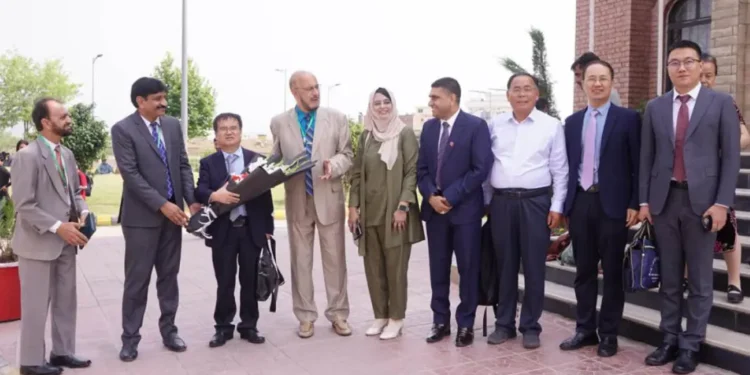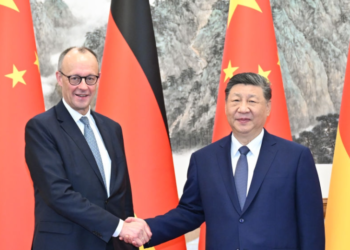TIANJIN, CHINA; Member states of the Shanghai Cooperation Organisation (SCO) on Monday condemned recent terrorist attacks in Pahalgam, on the Jaffer Express, and in Khuzdar, vowing accountability for the perpetrators and reaffirming their commitment to strengthen collective counterterrorism measures.
In a joint statement issued after the SCO Council of Heads of State meeting in Tianjin, leaders emphasized that organizers, sponsors, and executors of such attacks must be held responsible. They reaffirmed their determination to combat terrorism, separatism, and extremism, stressing that using terrorist or extremist groups for political or selfish purposes is unacceptable. The statement also highlighted the key role of sovereign states in addressing these threats.
The declaration comes in the wake of heightened tensions between Pakistan and India following the April 22 Pahalgam attack. India, without presenting evidence, accused Pakistan of involvement—claims Islamabad has denied. In retaliation for India’s cross-border strikes, Pakistan launched Operation Bunyan-um-Marsoos, downing six Indian Air Force jets, including three Rafales.
SCO members also welcomed Pakistan’s recent success in having the United States formally designate the Balochistan Liberation Army (BLA) and its Majeed Brigade faction as a Foreign Terrorist Organisation (FTO). The BLA, allegedly supported by India, had claimed responsibility for the March Jaffer Express hijacking that killed 31 civilians and security personnel while taking more than 300 passengers hostage.
The summit highlighted multilateral cooperation in counterterrorism, including joint exercises, information-sharing, and monitoring by the SCO Regional Anti-Terrorist Structure (RATS). Members affirmed plans to expand such initiatives and implement the 2026–2030 Program of Cooperation to counter extremist ideology, promote tolerance, and prevent racial or religious discrimination in the region.
The SCO statement also addressed Middle East tensions, condemning Israeli and U.S. military strikes on Iran in June 2025, describing them as violations of international law and threats to nuclear safety.
On broader international relations, Presidents Xi Jinping and Vladimir Putin criticized Western policies. Xi highlighted global instability and “bullying behavior” by some nations, while Putin defended Russia’s Ukraine operations, blaming Western interference and NATO expansion for the crisis.
Xi proposed a new Global Governance Initiative (GGI) emphasizing the Global South, advocating sovereign equality, rule of law, multilateralism, people-centered policies, and actionable solutions. He also called for a new SCO development bank, a $280 million aid package, and a $1 billion loan program for member states. China will additionally establish an AI cooperation centre and invite SCO nations to participate in China’s lunar research program.
The SCO summit reflected a growing commitment among member states to regional security, economic cooperation, and the creation of an alternative global governance system less dependent on Western-dominated institutions.
Key Elements of the Tianjin Declaration
The declaration emphasizes several broad objectives, including the promotion of peace, stability, and inclusive growth across Eurasia. It underlines the need for member states to jointly tackle emerging global challenges such as terrorism, extremism, climate change, energy security, and the misuse of digital technologies.
Importantly, the declaration also integrates India’s vision of “One Earth, One Family, One Future,” highlighting the SCO’s acknowledgement of collective responsibility in addressing transnational issues.
Supporting Documents Signed
Alongside the Tianjin Declaration, the summit produced a comprehensive package of 20 key documents, which provide a concrete framework for SCO cooperation up to 2035. These include:
- Development Strategy for SCO until 2035 – mapping long-term priorities for political, economic, and cultural engagement.
- Cooperation Programme on Countering Extremist Ideology (2026–2030) – to enhance intelligence sharing and preventive strategies.
- Energy Cooperation Development Strategy Roadmap up to 2030 – to promote joint investment in sustainable energy and resource management.
- Digital Economy and AI Statements – encouraging innovation while addressing risks tied to advanced technologies.
- Green Industry and Sustainable Investment Framework – aimed at accelerating eco-friendly growth models.
Additionally, Laos was formally recognized as a Dialogue Partner, while the SCO obtained observer status in the Commonwealth of Independent States (CIS), expanding its global outreach.
Collective Condemnation and Sympathies
The Tianjin Declaration also carried a strong humanitarian dimension. Leaders expressed solidarity with victims of terrorism, specifically condemning the recent Pahalgam attack, and extended condolences to the affected families. This reflects the SCO’s growing role in not just regional but also global counterterrorism narratives.
Strategic Implications
Observers view the declaration as a major step toward reinforcing Eurasian unity at a time when geopolitical rivalries are reshaping global alignments. By integrating sustainable development, digital governance, and security cooperation into a single framework, the SCO aims to balance hard security needs with socio-economic priorities.
The inclusion of India’s “One Earth, One Family, One Future” vision is particularly significant, as it underscores a shared aspiration for harmony and joint prosperity despite ongoing regional disputes.
Looking Ahead
With the Tianjin Declaration and supporting agreements, the SCO has outlined a clear and ambitious agenda that stretches to 2035. Analysts note that the bloc’s success will depend on how effectively member states can overcome bilateral differences and implement these collective strategies.
For now, the Tianjin Declaration marks a turning point—transforming the SCO from a primarily security-focused alliance into a broader platform for political, economic, and environmental cooperation, reflecting the evolving needs of its diverse membership.


















